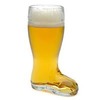Today's Specials
Munich Lamb Shank 19.95
Monster Martinis
2 for 1 all day!
Munich Lamb Shank 19.95
Monster Martinis
2 for 1 all day!
MENU
Did You Know?
Tue, 30th October, 2012
To this day, all German Beer is brewed according to the 'Bavarian Purity Law of 1516.
This "beer purity" law is one of the most remarkable and perhaps most misunderstood pieces of legislation.
The original law was a ducal decree issued on April 23, 1516, by the Bavarian co-rulers Duke Wilhelm IV and Duke Ludwig X (below). It was introduced at a meeting of an assembly of the Estates of Bavaria, at Ingolstadt, some 60 miles north of Munich. Initially only in feudal Bavaria, but later in all of Germany, the Reinheitsgebot gave government the tools to regulate the ingredients, processes and quality of beer sold to the public (and to levy taxes on beer!).
The Reinheitsgebot is the oldest, still valid food safety law in the world.
The 1516 Reinheitsgebot simply stipulated that only barley, hops, and water may be used to make the brew. The existence of yeast had not yet been discovered. The intent of the law was to keep beer "pure" by feudal decree, that is, to keep cheap and often unhealthy ingredients — such as rushes, roots, mushrooms, and animals products — out of the people's drink. In medieval times, brewers often used such ingredients to raise their profits by lowering their standards.
The word "Reinheit" (purity), however, did not appear anywhere in the original text. It only started to make its appearance in German legal texts around 1918. Until then, the law was usually referred to as the "surrogate prohibition."
In modern times, the purity law is part of the German tax code. It states that, in bottom-fermented beers, that is, lagers, brewers may use only barley malt, hops, yeast and water.
Specifically, this rule forbids the brewing in Germany of lagers containing spices (as do many Belgian beers), corn or rice (as do virtually all mass-produced industrial beers in the rest of the world), sugar (to be found in many Belgian and British beers), un-malted grains (required for many Belgian and British beer styles), as well as chemical additives and stabilizers.
Experienced drinkers know that, unlike others, German Beer won't give you a headache.
So Drink up! It's as close to healthy Alcohol as you can get.
This "beer purity" law is one of the most remarkable and perhaps most misunderstood pieces of legislation.
The original law was a ducal decree issued on April 23, 1516, by the Bavarian co-rulers Duke Wilhelm IV and Duke Ludwig X (below). It was introduced at a meeting of an assembly of the Estates of Bavaria, at Ingolstadt, some 60 miles north of Munich. Initially only in feudal Bavaria, but later in all of Germany, the Reinheitsgebot gave government the tools to regulate the ingredients, processes and quality of beer sold to the public (and to levy taxes on beer!).
The Reinheitsgebot is the oldest, still valid food safety law in the world.
The 1516 Reinheitsgebot simply stipulated that only barley, hops, and water may be used to make the brew. The existence of yeast had not yet been discovered. The intent of the law was to keep beer "pure" by feudal decree, that is, to keep cheap and often unhealthy ingredients — such as rushes, roots, mushrooms, and animals products — out of the people's drink. In medieval times, brewers often used such ingredients to raise their profits by lowering their standards.
The word "Reinheit" (purity), however, did not appear anywhere in the original text. It only started to make its appearance in German legal texts around 1918. Until then, the law was usually referred to as the "surrogate prohibition."
In modern times, the purity law is part of the German tax code. It states that, in bottom-fermented beers, that is, lagers, brewers may use only barley malt, hops, yeast and water.
Specifically, this rule forbids the brewing in Germany of lagers containing spices (as do many Belgian beers), corn or rice (as do virtually all mass-produced industrial beers in the rest of the world), sugar (to be found in many Belgian and British beers), un-malted grains (required for many Belgian and British beer styles), as well as chemical additives and stabilizers.
Experienced drinkers know that, unlike others, German Beer won't give you a headache.
So Drink up! It's as close to healthy Alcohol as you can get.





